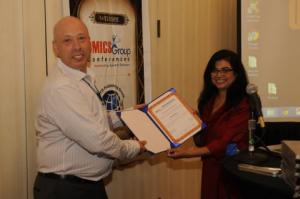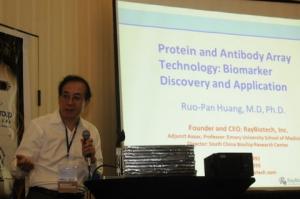Impact of Biomarkers Development in Health Diagnostics and Clinical Research
OMICS Group Clinical Conferences: 4th International Conference on Biomarkers & Clinical Research, during July 15-17, 2013 at Philadelphia, USA.
LOS ANGELES, CA, July 16, 2013 /EINPresswire.com/ -- Biomarkers: Diagnostic Learning and Curing MethodologiesOMICS Group Biomarkersʼ10, ʼ11 & ʼ12 have churned up the scientific thoughts and have proved the importance of disease diagnostics vital towards the curing efficacy; thus generated the research methodologies towards grounding a scientific gathering with the theme “Impact of biomarkers development in health diagnostics and clinical research”. The probability of success always increase with the increase in the number of close to success attempts; the discovery or invention of an abstract cure for any disease or disorder lies in the fact “ How effective the clinical trials were been ? ”. Now this Biomarkers meeting with theme integrated to clinical trials will help to find out either the specific molecule or the effective molecular pathway causing the disease or disorder. The conference has tried grounding every aspect related to the Biomarkers Discovery covering the possible research areas. The near to unity ratio of Academic to Industry participation will increase and positively add on to the developmental probability of research methodologies from scientific thoughts and discussions. The conceptual and applicable knowledge sharing will also foster the organizational collaborations towards scientific acceleration.
Biomarkers-2013 focuses on the development and application of biomarkers as key role indicators in health diagnostics, has become a central strategy in a general re-evaluation of drug discovery processes and points the way to major changes in health diagnostics and clinical research. This three days conference, assembles leading scientists, researchers, decision-makers and other players across the industry spectrum, that provides a unique opportunity to gain the latest biomarker developments and its application in health diagnostics, oncology and in clinical research.
The conference has also gathered support from Bentham Science Publishers, Eoro Science Con, US Biomarkers, Molecular Targeting Technology Inc (MTTI), Biomarkers Profile Corporation, Genome Web, Pharma Phorum as the media partners. MTTI has already published the conference description in two of its press release; also the citing can be viewed at webpages of Media Partners. BD Diagnostics, Affymettiz and Biomarkers Profile Corporation are participating as exhibitors at this conference. Biomarkers-2013 conference has been appreciated with a huge gathering from more than 30 countries.
About the exhibitors:
BD is a medical technology company that serves healthcare institutions, life science researchers, clinical laboratories, industry and the general public. BD manufactures and sells a broad range of medical supplies, devices, laboratory equipment and diagnostic products. BD is headquartered in the United States and has offices in more than 50 countries worldwide. BD Diagnostics is a leading provider of products for the safe collection and transport of diagnostics specimens, as well as instruments and reagent systems to accurately detect a broad range of infectious diseases, healthcare-associated infections (HAIs) and cancers. The BD Diagnostics segment focuses on improving health outcomes for patients by providing laboratories with solutions that improve quality, enhance laboratory system productivity and inform medical decisions. Client portfolio includes Hospitals, laboratories and clinics, Reference laboratories, Blood banks, Healthcare workers, Public health agencies, Physiciansʼ office practices, Industrial and food microbiology laboratories. Product portfolio includes Integrated systems for specimen collection, Safety-engineered blood collection products and systems, Automated blood culturing systems, Molecular testing systems for infectious diseases and womenʼs health, Microorganism identification and drug susceptibility systems, Liquid-based cytology systems for cervical cancer screening, Rapid diagnostic assays, Plated media, Microbiology laboratory automation.
Ammymetrix Inc. USA is a pioneer in microarray technology and a leader in genomics analysis, Affymetrix now develops and provides innovative technologies that enable multiplex and parallel analysis of biological systems at the cell, protein, and gene level, facilitating the rapid translation of results into biology for a better world. Our extensive portfolio of transitional and clinical solutions enables scientists and clinicians to rapidly translate their research into understanding underlying disease mechanisms, identifying biomarkers for personalized medicine, creating novel molecular diagnostic tests, and improving genetic marker-assisted breeding programs in agriculture for human health and wellness. We strive to provide leadership and support, partnering with our customers in their quest for answers toward clinical utility and routine use. Our mission is to enable the translation of biological knowledge into routine practice. Services portfolio includes Automated Agrigenomics Genotyping with newly discovered SNPs, close to 2 million sample variant, hands-free array processing and polyploid genotyping; Biobank Genotyping Arrays for thought leaders in the human genetics community for high-throughput, high-value genotyping of large sample cohorts to explore the genetics of complex diseases with a single comprehensive low-cost solution; Accurate Expression Data has Low sample input, biomarkers discovery in multiple disease areas, can perform gene expression profiling and can be used with the most widely-cited array; miRNA Target Site Genotyping Arrays includes known and predicted SNPs and indels in genes for miRNA promoters, miRNA seed sites, precursor miRNA stem-loop regions, mRNA target binding site, and miRNA processing proteins with biologically relevant content closely tailored to the specific research.
Biomarkers Profile Corporation, USA was developed on the idea of making biomarker discovery more efficient by breaking the discovery process into different components and developing each component separately. The discovery of new biomarkers is extremely important. However, biomarkers are very difficult to find. Most biomarker discovery attempts fail. Sharing of information and results can facilitate the involvement of small companies in the biomarkers discovery as well. The company will be exhibiting a Biomarkers Database. The working business modules have three phases namely Information sharing, Data Mining and Technology implementation.
Prominent speakers present at the meet
Dr. Lawrence Greenfield from Affymetrix delivered a talk highlighting the application and implementation of Affymetrix OncoScan into the basis of genomic treatments for cancer. The caner is a matter fact from the distortion of cell cycle and thus the genome irregularities. The most common method to identify these irregularities is by SNP Genotyping. The technology uses the Molecular Inversion Probe (MIP) assay and has successfully performed well with high degradable DNA in addition to the genomic deletions, additions and copy number alterations. The technology has helped in understanding the molecular basis of cancer though a proved set of more accurate disease diagnosis, prognosis and new therapeutic interventions. The technology will be upgraded during later this year with an updated version on the row.
Challenges and advances in absolute quantization of peptide hormones by Eduard Rogatsky. Typical method of choice for quantitative LC/MS analysis of small molecules and tryptic digests is MRM or SRM. The deciding factors include post-translation modifications, influence of tertiary structure on electrospray ionization and especially different fragmentation pathways of peptides by collision-induced dissociation. Using 2D LC for C-peptide analysis we are able to use isotopic labeling to define previously inaccessible aspects of insulin secretion and biosynthesis in vivo. Specifically we have defined a method using deuterated Leucine infusion combined with isotopic analysis of incorporated Leucine into C-peptide for calculation of denovo insulin biosynthesis rates. This method provides a non invasive “biopsy” into the intracellular processes within the insulin producing beta cell. Our novel data is an example of “kinetic proteomics” and has provided fresh insights into the pathophysiology of human diabetes.
Dr. Tao Chen, Food and Drug Administration, USA discussed about how multiple studies have revealed the presence of miRNAs and relatively stable in clinically accessible biofluids such as blood and urine. In our studies, microRNA profiling and individual miRNAs in rodent blood and urine have been evaluated for biomarkers to predict toxicities induced by several chemicals and drugs. The microRNA induction resulted from the release of the damaged heart cells. These results suggest that miRNA profilings and specific miRNAs in biofluids could reflect toxicities induced by chemicals and drugs and therefore have the potential to be used as noninvasive preclinical and clinical biomarkers.
Protein biomarker discovery and validation by Ruo-Pan Huang, RayBiotech, Inc., USA. Protein biomarkers could be used for early diagnosis of life-threatening diseases, such as cancer, identifying novel drug targets, uncovering mechanisms of drug action or adverse responses to a drug, and monitoring or predicting patientsʼ responses to treatment. The ability to semi-quantitatively and quantitatively measure the expression levels of multiple proteins from a variety of biological samples provides a powerful tool for identification of new biomarkers and for validation of potential biomarkers, respectively. We have developed two biomarker discovery and development formats: multiple dimensional profiling platform and target profiling platform. Samples from diverse sources can be applied in our systems.
Stabilizing proteins and peptides in human plasma sample for biomarker development by Jizu Yi, BD Diagnostics, USA. Proteins and peptides in serum and plasma samples contain status information of a ariety of diseases. However, these proteins and peptides are subject to proteolytic and other enzymatic degradation intrinsic to plasma sample, resulting in preanalytical variability and a barrier in translating the discovered biomarkers from batch-side research into bedside applications. One major challenge is to stabilize these peptides in blood specimens against intrinsic proteolytic activities for accurate quantization. We also found the other protease and peptidase activities caused the digestions of intervening peptides, specifically multiple cleavage sites were found on OXM sequences. Both DPP IV and other protease activities were inhibited with our developed technology.
Yaping Tian, PLA General Hospital, China explained the clinical significance of serum cytokine profile in variety of cancers, The study confirmed that inflammation were involved in the development of cancer. In this study serum cytokines and tumor markers have been studies and explore their clinical utility of biomarker profile. The results showed that serum levels of interleukin-8 and monocyte chemoattractant protein1 (MCP-1) were both significantly higher in cervical diseases patients. IL-1β and IL-2 is obviously increased in pancreatic cancer, and compared to benign diseases, MCP-1 decreased and GM-CSF increased. Serum IL-6, MCP-1 and TNF-α also have been found have significant difference between different stage of CRC. The above results indicated that the level of serum cytokines is closed related with the development of variety of cancer and combined use with tumor marker will be significantly improve the diagnostic value.
Carlo Trugenberger, InfoCodex AG, Semantic Technologies, Switzerland presented a talk on Discovery of biomarkers by text mining The discovery of relevant biomarkers is aided by in silico techniques based on applying data mining and computational chemistry on large molecular databases. However, there is an even larger source of valuable information available that can potentially be tapped for such discoveries: repositories constituted by research documents. The study is a pilot experiment to discover potential novel biomarkers and phenotypes for diabetes and obesity by self-organized text mining of about 120,000 PubMed abstracts, public clinical trial summaries, and internal Merck research documents. The reported approach of employing autonomous self-organising semantic engines to aid biomarker discovery, supplemented by appropriate manual curation processes, shows promise and has potential to impact pharmaceutical research, for example to shorten time-to-market of novel drugs, or speed up early recognition of dead ends and adverse reactions.
Osteopontin splice variants are cancer progression markers, Georg F. Weber, University of Cincinnati, USA. The early detection of tumor dissemination is a challenge in cancer diagnosis because biomarkers for invasiveness are largely lacking in clinical medicine. Osteopontin is frequently secreted by cancer cells and plays important roles in their ability to metastasize. Osteopontin is subject to alternative splicing, which yields three messengers; We have developed a realtime RT-PCR blood test and evaluated it in a pilot study of breast, lung, pancreatic, gynecologic, and other cancers, compared to non-cancer controls. Specifically, breast carcinomas were associated with significantly higher levels of osteopontin-c mRNA in the blood than carcinomas in situ. Osteopontin-b and -c in the blood are biomarkers for distinct cancers.
Protein Biomarkers and Cancer Biomarkers
Biomarker discovery using proteins identified across disease. Biomarker discovery is a difficult series of experiments due to the number of different molecules in clinical samples, the wide dynamic range of these molecules, their fluctuations and modifications. Biomarkers can be used as indicators of disease, disease progression, and response to therapy or complications. the comparison of biomarkers across different disease yields a different set of candidates than if the disease were studied in isolation.
The diagnosis of ductal carcinoma in situ (DCIS) is increasing worldwide. there is a need for developing tissue biomarkers to determine the likelihood that initial breast tumor identified on diagnostic biopsy remains contained in situ, as opposed to becoming invasive. Measurements in DCIS revealed previously unidentified quantitative differences in the insulin-like growth factor I receptor, Ras oncogene like protein 1, and Rho GTPase guanine nucleotide exchange factor VAV2, the proteins implicated in the regulation of invasion in preclinical models.
The status of estrogen receptor (ER) in breast cancer is the cornerstone of endocrine therapy. Two isoforms of ER are known - ERα and ERβ, the breast tumors are characterized based on the status of ERα. Despite the expression of ERα some patients develop tamoxifen resistance and 50% present de novo tamoxifen resistance. Mammalian target of rapamycin (mTOR) is a central hub of signaling pathways impacting cell growth, proliferation, metabolism and protein synthesis.
Now it is the time to attend 4th International Conference on Biomarkers & Clinical Research to share about the Biomarkers and its contributions of development in health diagnostics and clinical research which will be held in Courtyard by Marriott Philadelphia Downtown, USA.
Prominent Institutions, Universities and Research bodies at the conference
The whole sessions was thoroughly enjoyed by attendees of the conference. Biomarkers-2013 represented more than 70 US universities and 50 reputed Universities from different corners of the world.
Future OMICS Group Conferences on Biomarkers:
OMICS Group 5th International Conference on Biomarkers & Clinical Research (Biomarkers-2014) will be held on April 15-17, 2014 University of Oxford, UK
For further details contact
Michael Smith
Biomarkers-2013 Organizing Committee
OMICS Group Clinical Conferences
5716 Corsa Ave., Suite 110,
Westlake, Los Angeles, CA 91362-7354, USA
Tel: 1-650-268-9744
Fax: 1-650-618-1414
Toll Free: +1-800-216-6499
Email: biomarkers2013@omicsonline.com
http://www.omicsonline.org/contact.php
Michael Smith
OMICS Group Clinical Conferences
+1-650-268-9744
email us here
Legal Disclaimer:
EIN Presswire provides this news content "as is" without warranty of any kind. We do not accept any responsibility or liability for the accuracy, content, images, videos, licenses, completeness, legality, or reliability of the information contained in this article. If you have any complaints or copyright issues related to this article, kindly contact the author above.




